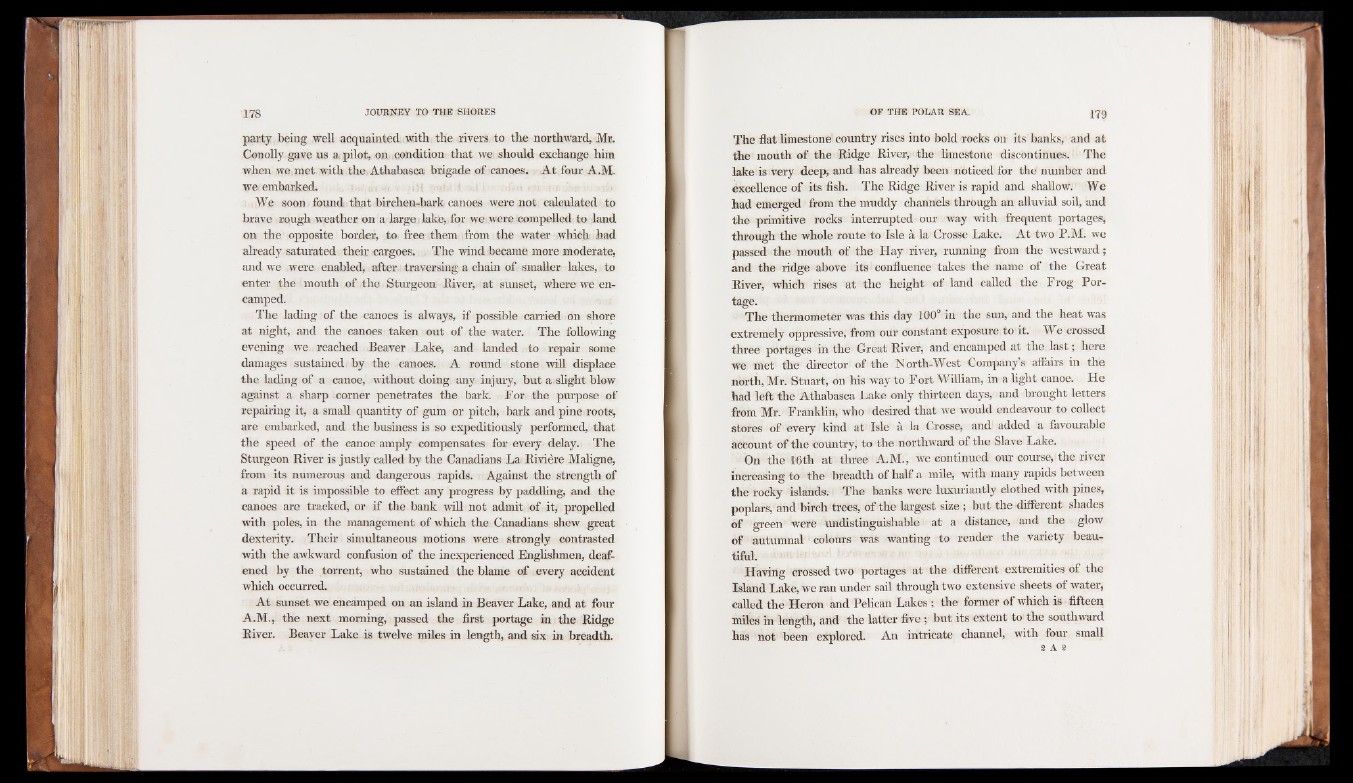
party being well acquainted with the rivers to the northward, Mr.
Conolly gave us a, pilot, on .condition that we. should exchange him
when we met with the Athabasca brigade of canoes. At four A.M.
we emharked.
We soon found that birehen-hark canoes were not calculated to
brave rough weather on a large , lake, for we were .compelled to land
on the opposite border, to free them ifrom the water which had
already saturated their cargoes. The wind became more moderate,
and we were enabled, after traversing a chain of smaller lakes, to
enter the mouth of the Sturgeon River, at sunset, where we encamped.
The lading of the canoes is always, if possible carried on shore
at night, and the canoes taken out of the water. The following
evening we reached Beaver Lake, and landed to repair some
damages sustained by the canoes. A round stone will displace
the lading of a canoe, without doing any injury, but a slight blow
against a sharp corner penetrates the bark. For the purpose of
repairing it, a small quantity of gum or pitch, bark and pine roots,
are embarked, and the business is so expeditiously performed, that
the speed of the canoe amply compensates for every delay. The
Sturgeon River is justly called by the Canadians La Rivière Maligne,
from its numerous and dangerous rapids. Against the strength of
a rapid it is impossible to effect any progress by paddling, and the
canoes are tracked, or if the bank will not admit of it* propelled
with poles, in the management of which the Canadians shew great
dexterity. Their simultaneous motions were strongly contrasted
with the awkward confusion of the inexperienced Englishmen, deafened
by the torrent, who sustained the blame of every accident
which occurred.
At sunset we encamped on an island in Beaver Lake, and at four
A.M., the next morning, passed the first portage in the Ridge
River. Beaver Lake is twelve miles in length, and six in breadth.
The flat limestone country rises into bold rocks on its banks, and at
the mouth of the Ridge River, the limestone discontinues. The
lake is very deep, and has already been noticed for the number and
excellence of its fish. The Ridge River is rapid and shallow. We
had emerged from the muddy channels through an alluvial soil, and
the primitive rocks interrupted our way with frequent portages,
through the whole route to Isle a la Crosse Lake. At two P.M. we
passed the mouth of the Hay river, running from the westward;
and the ridge above its confluence takes the name of the Great
River, which rises at the height of land called the Frog Portage.
The thermometer was this day 100° in the sun, and the heat was
extremely oppressive, from our constant exposure to it. We crossed
three portages in the Great River, and encamped at the. last; here
we met the director of the N- orth-West Company s affairs in the
north, Mr. Stuart, on his way to Fort William, in a light canoe. He
had left the Athabasca Lake only thirteen days, and brought letters
from Mr. Franklin, who desired that we would endeavour to collect
stores of every kind at Isle a la Crosse, and added a favourable
account of the country; to the northward of the Slave Lake.
On the '16th at three A.M., we continued our course, the river
increasing to the breadth of half a mile, with many rapids between
the rocky islands. The banks were luxuriantly clothed with pines,
poplars, and birch trees, of the largest size ; but the different shades
of green were undistinguishable at a distance, and the glow
of autumnal colours was wanting to render the variety beautiful.
Having crossed two portages at the different extremities of the
Island Lake, we ran under sail through two extensive sheets of water,
called the Heron and Pelican Lakes ; the former of which is fifteen
miles in length, and the latter five ; but its extent to the southward
has not been explored. An intricate channel, with four small